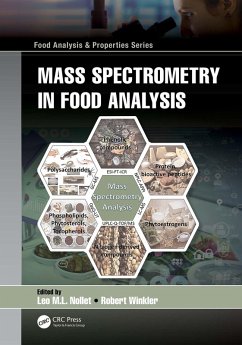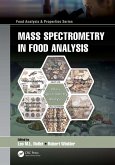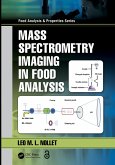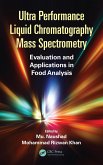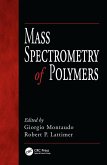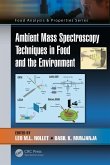Mass Spectrometry in Food Analysis (eBook, PDF)
Redaktion: Nollet, Leo; Winkler, Robert
67,95 €
67,95 €
inkl. MwSt.
Sofort per Download lieferbar

34 °P sammeln
67,95 €
Als Download kaufen

67,95 €
inkl. MwSt.
Sofort per Download lieferbar

34 °P sammeln
Jetzt verschenken
Alle Infos zum eBook verschenken
67,95 €
inkl. MwSt.
Sofort per Download lieferbar
Alle Infos zum eBook verschenken

34 °P sammeln
Mass Spectrometry in Food Analysis (eBook, PDF)
Redaktion: Nollet, Leo; Winkler, Robert
- Format: PDF
- Merkliste
- Auf die Merkliste
- Bewerten Bewerten
- Teilen
- Produkt teilen
- Produkterinnerung
- Produkterinnerung

Bitte loggen Sie sich zunächst in Ihr Kundenkonto ein oder registrieren Sie sich bei
bücher.de, um das eBook-Abo tolino select nutzen zu können.
Hier können Sie sich einloggen
Hier können Sie sich einloggen
Sie sind bereits eingeloggt. Klicken Sie auf 2. tolino select Abo, um fortzufahren.

Bitte loggen Sie sich zunächst in Ihr Kundenkonto ein oder registrieren Sie sich bei bücher.de, um das eBook-Abo tolino select nutzen zu können.
This book contains an introductory section that explains the basics of MS and the difference between targeted and un-targeted strategies for beginners. Further, it points out new analytical challenges, such as monitoring contaminants of emerging concern (CECs), and presents innovative techniques, e.g., ambient ionization MS and data mining.
- Geräte: PC
- mit Kopierschutz
- eBook Hilfe
Andere Kunden interessierten sich auch für
![Mass Spectrometry in Food Analysis (eBook, ePUB) Mass Spectrometry in Food Analysis (eBook, ePUB)]() Mass Spectrometry in Food Analysis (eBook, ePUB)67,95 €
Mass Spectrometry in Food Analysis (eBook, ePUB)67,95 €![Mass Spectrometry Imaging in Food Analysis (eBook, PDF) Mass Spectrometry Imaging in Food Analysis (eBook, PDF)]() Mass Spectrometry Imaging in Food Analysis (eBook, PDF)186,95 €
Mass Spectrometry Imaging in Food Analysis (eBook, PDF)186,95 €![Ultra Performance Liquid Chromatography Mass Spectrometry (eBook, PDF) Ultra Performance Liquid Chromatography Mass Spectrometry (eBook, PDF)]() Ultra Performance Liquid Chromatography Mass Spectrometry (eBook, PDF)49,95 €
Ultra Performance Liquid Chromatography Mass Spectrometry (eBook, PDF)49,95 €![Mass Spectrometry of Polymers (eBook, PDF) Mass Spectrometry of Polymers (eBook, PDF)]() Mass Spectrometry of Polymers (eBook, PDF)63,95 €
Mass Spectrometry of Polymers (eBook, PDF)63,95 €![Ambient Mass Spectroscopy Techniques in Food and the Environment (eBook, PDF) Ambient Mass Spectroscopy Techniques in Food and the Environment (eBook, PDF)]() Ambient Mass Spectroscopy Techniques in Food and the Environment (eBook, PDF)199,95 €
Ambient Mass Spectroscopy Techniques in Food and the Environment (eBook, PDF)199,95 €![Light Scattering Technology for Food Property, Quality and Safety Assessment (eBook, PDF) Light Scattering Technology for Food Property, Quality and Safety Assessment (eBook, PDF)]() Light Scattering Technology for Food Property, Quality and Safety Assessment (eBook, PDF)269,95 €
Light Scattering Technology for Food Property, Quality and Safety Assessment (eBook, PDF)269,95 €![Handbook of Near-Infrared Analysis (eBook, PDF) Handbook of Near-Infrared Analysis (eBook, PDF)]() Handbook of Near-Infrared Analysis (eBook, PDF)94,95 €
Handbook of Near-Infrared Analysis (eBook, PDF)94,95 €-
-
-
This book contains an introductory section that explains the basics of MS and the difference between targeted and un-targeted strategies for beginners. Further, it points out new analytical challenges, such as monitoring contaminants of emerging concern (CECs), and presents innovative techniques, e.g., ambient ionization MS and data mining.
Dieser Download kann aus rechtlichen Gründen nur mit Rechnungsadresse in A, B, BG, CY, CZ, D, DK, EW, E, FIN, F, GR, HR, H, IRL, I, LT, L, LR, M, NL, PL, P, R, S, SLO, SK ausgeliefert werden.
Produktdetails
- Produktdetails
- Verlag: Taylor & Francis eBooks
- Seitenzahl: 462
- Erscheinungstermin: 21. März 2022
- Englisch
- ISBN-13: 9781000539257
- Artikelnr.: 63576690
- Verlag: Taylor & Francis eBooks
- Seitenzahl: 462
- Erscheinungstermin: 21. März 2022
- Englisch
- ISBN-13: 9781000539257
- Artikelnr.: 63576690
- Herstellerkennzeichnung Die Herstellerinformationen sind derzeit nicht verfügbar.
Leo M. L. Nollet earned an MS (1973) and PhD (1978) in biology from the Katholieke Universiteit Leuven, Belgium. He is an editor and associate editor of numerous books. He edited for M. Dekker, New York-now CRC Press of Taylor & Francis Publishing Group-the first, second, and third editions of Food Analysis by HPLC and Handbook of Food Analysis. The last edition is a two-volume book. Dr. Nollet also edited the Handbook of Water Analysis (first, second, and third editions) and Chromatographic Analysis of the Environment, third and fourth editions (CRC Press). With F. Toldrá, he coedited two books published in 2006, 2007, and 2017: Advanced Technologies for Meat Processing (CRC Press) and Advances in Food Diagnostics (Blackwell Publishing-now Wiley). With M. Poschl, he coedited the book Radionuclide Concentrations in Foods and the Environment, also published in 2006 (CRC Press). Dr. Nollet has also coedited with Y. H. Hui and other colleagues on several books: Handbook of Food Product Manufacturing (Wiley, 2007), Handbook of Food Science, Technology, and Engineering (CRC Press, 2005), Food Biochemistry and Food Processing (first and second editions; Blackwell Publishing-now Wiley-2006 and 2012), and the Handbook of Fruits and Vegetable Flavors (Wiley, 2010). In addition, he edited the Handbook of Meat, Poultry, and Seafood Quality, first and second editions (Blackwell Publishing-now Wiley-2007 and 2012). From 2008 to 2011, he published five volumes on animal product-related books with F. Toldrá: Handbook of Muscle Foods Analysis, Handbook of Processed Meats and Poultry Analysis, Handbook of Seafood and Seafood Products Analysis, Handbook of Dairy Foods Analysis (2nd edition in 2021), and Handbook of Analysis of Edible Animal By-Products. Also, in 2011, with F. Toldrá, he coedited two volumes for CRC Press: Safety Analysis of Foods of Animal Origin and Sensory Analysis of Foods of Animal Origin. In 2012, they published the Handbook of Analysis of Active Compounds in Functional Foods. In a coedition with Hamir Rathore, Handbook of Pesticides: Methods of Pesticides Residues Analysis was marketed in 2009; Pesticides: Evaluation of Environmental Pollution in 2012; Biopesticides Handbook in 2015; and Green Pesticides Handbook: Essential Oils for Pest Control in 2017. Other finished book projects include Food Allergens: Analysis, Instrumentation, and Methods (with A. van Hengel; CRC Press, 2011) and Analysis of Endocrine Compounds in Food (Wiley-Blackwell, 2011). Dr. Nollet's recent projects include Proteomics in Foods with F. Toldrá (Springer, 2013) and Transformation Products of Emerging Contaminants in the Environment: Analysis, Processes, Occurrence, Effects, and Risks with D. Lambropoulou (Wiley, 2014). In the series Food Analysis & Properties, he edited (with C. Ruiz-Capillas) Flow Injection Analysis of Food Additives (CRC Press, 2015) and Marine Microorganisms: Extraction and Analysis of Bioactive Compounds (CRC Press, 2016). With A.S. Franca, he coedited Spectroscopic Methods in Food Analysis (CRC Press, 2017), and with Horacio Heinzen and Amadeo R. Fernandez-Alba he coedited Multiresidue Methods for the Analysis of Pesticide Residues in Food (CRC Press, 2017). Further volumes in the series Food Analysis & Properties are Phenolic Compounds in Food: Characterization and Analysis (with Janet Alejandra Gutierrez-Uribe, 2018), Testing and Analysis of GMO-containing Foods and Feed (with Salah E. O. Mahgoub, 2018), Fingerprinting Techniques in Food Authentication and Traceability (with K. S. Siddiqi, 2018), Hyperspectral Imaging Analysis and Applications for Food Quality (with N.C. Basantia, Leo M.L. Nollet, Mohammed Kamruzzaman, 2018), Ambient Mass Spectroscopy Techniques in Food and the Environment (with Basil K. Munjanja, 2019), Food Aroma Evolution: During Food Processing, Cooking, and Aging (with M. Bordiga, 2019), Mass Spectrometry Imaging in Food Analysis (2020), Proteomics in Food Authentication (with S. Ötle¿, 2020), Analysis of Nanoplastics and Microplastics in Food (with K.S. Siddiqi, 2020), Chiral Organic Pollutants, Monitoring and Characterization in Food and the Environment (with Edmond Sanganyado and Basil K. Munjanja, 2020), Sequencing Technologies in Microbial Food Safety and Quality (with Devarajan Thangardurai, Saher Islam, Jeyabalan Sangeetha, 2021), and Nanoemulsions in Food Technology: Development, Characterization, and Applications (with Javed Ahmad, 2021). Robert Winkler studied biotechnology (Fachhochschule Jena, Germany) and biochemical engineering (University of Birmingham, UK). In 2004, he started a Ph.D. in natural products chemistry at the Leibniz Institute for Natural Product Research and Infection Biology, Hans Knöll Institute (HKI) Jena, Germany. During this time, Robert Winkler used mass spectrometry for structure elucidation. After graduating in 2007, he stayed at the HKI as PostDoc and head of the mass spectrometry and proteomics unit. In 2010, Robert Winkler accepted a call and founded the biochemical and instrumental analysis laboratory (labABI) at the CINVESTAV Irapuato, Mexico. He is a faculty member of two postgraduate programs: Plant Biotechnology and Integrative Biology. The labABI develops novel analytical platforms to study biological systems and food products, such as ambient ionization methods, mass spectrometry imaging tools, and mass spectrometry software for metabolomics and proteomics. Robert Winkler published about 100 articles in international magazines, including high-impact journals such as Nature, Analytical Chemistry, Angewandte Chemie, Talanta, etc. Besides, he holds patents on the technology developed in his group in MX, the USA, and Europe. In 2018/2019, he did a sabbatical stay at the Max Planck Institute of Ecological Chemistry, Jena, Germany. In 2020, Robert Winkler published the first book he edited: Processing Metabolomics and Proteomics Data with Open Software: A Practical Guide, 1st edition.; New Developments in Mass Spectrometry Series. Royal Society of Chemistry, Cambridge, UK.
Mass Spectrometry - Theoretics: Mass Spectrometry - Theoretics. Targeted - Untargeted MS. MS Analysis of Food Components: MS of Lipids. MS and Proteins. MS of Vitamins. Carbohydrate Analysis by MS. MS Analysis of Allergens. MS Analysis of Food Pigments. Flavour and Mass Spectrometry. Evaluation of Nutraceutical Value. MS Analysis of Residues: Pesticides by GC-MS, LC-MS, and LC-MS/MS. MS Food and Contact Materials. MS Analysis of Veterinary Drugs. MS of Pharmaceuticals. MS of and Pops. MS and Food Forensics. MS and Food Pathogens. Biogenic Amines Analysis by Mass Spectrometry. MS and Preservatives. MS and Mycotoxins. MS Analysis of Sweeteners. MS Analysis in Food Authentication: MS and Food Authentication. Emerging Fields: Emerging Fields in MS.
Mass Spectrometry - Theoretics: Mass Spectrometry - Theoretics. Targeted - Untargeted MS. MS Analysis of Food Components: MS of Lipids. MS and Proteins. MS of Vitamins. Carbohydrate Analysis by MS. MS Analysis of Allergens. MS Analysis of Food Pigments. Flavour and Mass Spectrometry. Evaluation of Nutraceutical Value. MS Analysis of Residues: Pesticides by GC-MS, LC-MS, and LC-MS/MS. MS Food and Contact Materials. MS Analysis of Veterinary Drugs. MS of Pharmaceuticals. MS of and Pops. MS and Food Forensics. MS and Food Pathogens. Biogenic Amines Analysis by Mass Spectrometry. MS and Preservatives. MS and Mycotoxins. MS Analysis of Sweeteners. MS Analysis in Food Authentication: MS and Food Authentication. Emerging Fields: Emerging Fields in MS.
